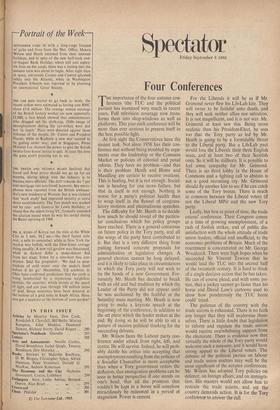Four Conferences
MHE importance of the four autumn con- ' ferences (the TUC and the political parties) has increased very much in recent years. Full television coverage now trans- forms them into shop-windows as well as platforms. This year each conference will be more than ever anxious to present itself in the'best possible light.
At first sight the Conservatives have the easiest task. Not since 1958 has their con- ference met without being troubled by argu- ments over the leadership or the Common Market or policies of colonial and penal reform. They have no problem—and that is their problem. Heath and Home and Maudling are certain to receive ovations. This is healing, but it is not enough. Social- ism is heading for one more, failure, but that in itself is not enough. Nothing is worse for a party's political health than to wrap itself in the flannel of congratu- latory motions and platitudinous speeches.
The difficulty for Mr. Heath is to decide how much he should reveal of the particu- lar conclusions which his policy groups have reached. There is a general consensus on future policy in the Tory party, and all the wings of the party have contributed to it. But that is a very, different thing from putting forward concrete proposals for administrative or legislative changes. A general election cannot be long delayed, and it is likely to take place in circumstances in which the Tory party will not wish to tie the hands of a new Government. For- tunately Mr. Heath has decided to break with an old and bad tradition by which the Leader of the Party did not appear until he was acclaimed by the faithful at the Saturday mass meeting. Mr. Heath is now going to make a keynote speech at the beginning of the conference, in addition to the set piece which the leader makes at the end. By doing so he will be able to set a pattern of incisive political thinking for the succeeding debates.
Mr. Wilson faces the Labour party con- ference under attack from right, left, and centre. He will survive. Indeed, he will prob- ably dazzle his critics into accepting that unemployment resulting from the policies of a Socialist Chancellor is more acceptable than when a Tory government orders the deflation, that immigration problems can be seen in better perspective if one stands on one's head, that all the promises that couldn't be kept in a boom will somehow miraculously be redeemed in a period of stagnation. Power is cement. For the. Liberals it will be as if Mr. Grimond never flew his Lib-Lab kite. They will swear to be faithful unto death, and they will seek neither allies nor salvation. It is not magnificent, and it is not war. Mr. Grimond at least saw this. Being more realistic than his President-Elect, he sees too that the Tory party as led by Mr. Heath is going to be a formidable threat to the Liberal party. But a Lib-Lab pact would lose the Liberals their three English seats, and at least two of their Scottish ones. So it will be stillborn. It is possible to feel some sympathy for Mr. Grimond. There is no third lobby in the House of Commons and a fighting 'call to abstain is not a good recruiting cry. Mr. Grimond should fly another kite to see if he can catch some of the Tory breeze. There is much in common between the Liberal voters (if not the Liberal MPs) and the new Tory party.
Lastly, but first in point of time, the trade unions' conference. Their Congress comes at a time of growing unemployment, of a rash of foolish strikes, and of public dis- satisfaction with the whole attitude of trade union leaders, official and unofficial, to the economic problems of Britain. Much of the resentment is concentrated on Mr. George Woodcock. There were high hopes when he succeeded Sir Vincent Tewson that he would lead the TUC into the second half of the twentieth century. It is hard to think of a single decisive action that he has taken. He can of course plead, and with some jus- tice, that a jockey cannot go faster than his horse and David Low's cartoons used to show how ponderously the TUC horse could tread.
The patience of the country with the trade unions is exhausted. There is no faith any longer that they will modernise them- selves. There is little doubt that legislation to reform and regulate the trade unions would receive overwhelming support from the electorate. There is evidence now that virtually the whole of the Tory party would welcome such a measure, and it would have strong appeal to the Liberal voters. The debates of the political parties on labour and trade union matters may well be the most significant of the autumn conferences. Mr. Wilson has adopted Tory policies on defence', on foreign affairs, and on immigra- tion. His masters would not allow him to restrain the trade unions, and yet the country demands action. It is for the Tory, conference to answer the call.






























 Previous page
Previous page